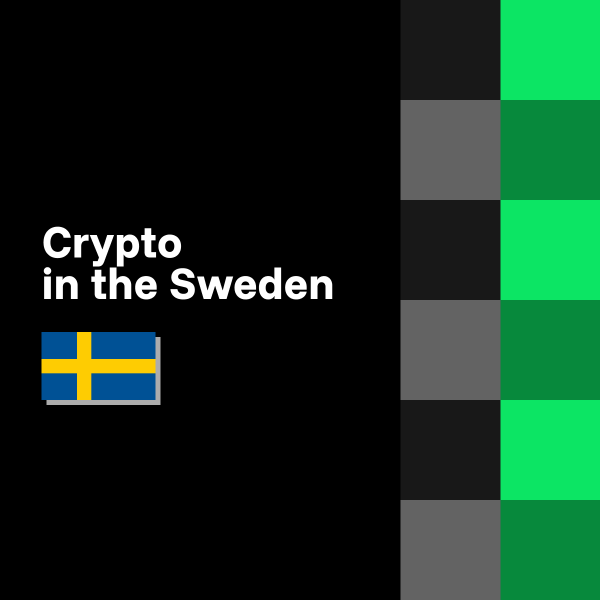Cryptocurrency is legal in Sweden. People and companies can trade digital assets, but they are not legal tender. The Swedish krona remains the official currency. Crypto is subject to EU-aligned regulations, including anti-money laundering rules and taxation. The Financial Supervisory Authority monitors the market to protect consumers.
Crypto taxes in Sweden
The Swedish Tax Agency (Skatteverket) treats cryptocurrency as a taxable asset. Tax rules apply to private individuals and businesses, and reporting deadlines follow the same calendar as other assets. For the 2025 tax year, the online portal opens on 18 March 2026, and the deadline to file is 2 May 2026.
What types of taxes are applied to crypto:
- Capital gains tax. 30% tax on profits from selling, exchanging, or lending crypto. Losses can be deducted up to 70%.
- Income tax. Regular income tax (20-52%) applies if crypto is earned as salary, through mining, or from rewards.
- Interest income tax. 30% tax on staking rewards or loan interest in crypto. Losses from interest payments are fully deductible.
For the 2025 tax year, the online portal opens on 18 March 2026 and the filing deadline is 2 May 2026.
Tax overview in Sweden is presented in the table below:
| Transaction type | Tax applied |
| Buying & holding | No |
| Selling or trading | Capital gains tax |
| Mining | Income tax |
| Staking income | Interest income tax |
| Salary in crypto | Income tax |
| Purchases and payments | Capital gains tax |
| ICO | Capital gains tax |
| Personal wallet transfers | No |
| Gifts, donations, airdrops, forks | No |
| Referral or other rewards | Income tax |
| Trading NFTs | Capital gains tax |
| Creating and selling NFTs | Income tax |
For official guidance, see the Swedish Tax Agency’s crypto guidelines.
Crypto regulations and compliance rules in Sweden
Sweden applies strict rules to cryptocurrency activities. Since December 30, 2024, the EU’s MiCA regulation and the Swedish Anti-Money Laundering Act cover all crypto-asset service providers.
Authorities that regulate crypto in Sweden:
- The Swedish Financial Supervisory Authority (SFSA) supervises service providers, enforces MiCA rules, manages licensing, and monitors AML compliance.
- The Swedish Tax Agency (Skatteverket) monitors tax reporting for digital assets and enforces compliance.
- The Swedish Ministry of Finance drafts legislation to align Swedish law with international standards and tax frameworks.
- The Swedish police (Polisen) investigates money laundering and financial crime involving digital assets.
Key compliance requirements:
- SFSA authorization. Firms must apply for a license from the SFSA. Application fees range from SEK 135,000 to SEK 690,000.
- AML and KYC compliance. Service providers must verify customer identity, monitor transactions, and report suspicious activity.
- Product governance and suitability. Companies must test if products are appropriate for consumers and define the target market.
- Market integrity rules. Insider trading, manipulation, and abusive practices are prohibited. Firms must monitor and report suspect activity to the SFSA.
- Corporate requirements. Companies must follow Swedish corporate law, including residency rules for certain board members.
Cryptocurrency is a high-risk and volatile asset class. You may lose all the money you invest. Past performance is not indicative of future results.
Conclusion: is cryptocurrency legal in Sweden?
Sweden recognizes cryptocurrency as a regulated financial asset. Trading and use are permitted, but crypto is not legal tender, and all activity is subject to EU-aligned rules.
The Swedish Tax Agency, Financial Supervisory Authority, and other bodies enforce taxation, licensing, and anti-money laundering obligations.
Businesses must meet strict compliance standards, and individuals must declare taxable gains and income. Together, these regulations are designed to increase transparency and oversight in Sweden’s digital asset market.
Disclaimer: The information provided is for informational purposes only and does not constitute legal, financial, or tax advice. Regulations may change, and their application can vary depending on individual circumstances. Before engaging in any cryptocurrency activity, check the latest guidance from the Swedish Tax Agency (Skatteverket), the Swedish Financial Supervisory Authority (Finansinspektionen), or other relevant authorities.
crypto experience
Unlock faster transactions with our highly secure crypto payment gateway

